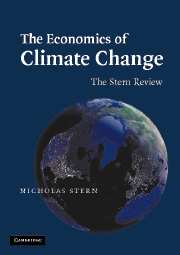Book contents
- Frontmatter
- Contents
- Preface
- Acknowledgements
- Introduction
- Summary of Conclusions
- Part I Climate Change – Our Approach
- Part II Impacts of Climate Change on Growth and Development
- Part III The Economics of Stabilisation
- 7 Projecting the Growth of Greenhouse-Gas Emissions
- 7A Climate Change and the Environmental Kuznets Curve
- 8 The Challenge of Stabilisation
- 9 Identifying the Costs of Mitigation
- 10 Macroeconomic Models of Costs
- 11 Structural Change and Competitiveness
- 11A Key Statistics for 123 UK Production Sectors
- 12 Opportunities and Wider Benefits from Climate Policies
- 13 Towards a Goal for Climate-Change Policy
- Part IV Policy Responses for Mitigation
- Part V Policy Responses for Adaptation
- Part VI International Collective Action
- Abbreviations and Acronyms
- Postscript
- Technical Annex to Postscript
- Index
12 - Opportunities and Wider Benefits from Climate Policies
Published online by Cambridge University Press: 05 March 2014
- Frontmatter
- Contents
- Preface
- Acknowledgements
- Introduction
- Summary of Conclusions
- Part I Climate Change – Our Approach
- Part II Impacts of Climate Change on Growth and Development
- Part III The Economics of Stabilisation
- 7 Projecting the Growth of Greenhouse-Gas Emissions
- 7A Climate Change and the Environmental Kuznets Curve
- 8 The Challenge of Stabilisation
- 9 Identifying the Costs of Mitigation
- 10 Macroeconomic Models of Costs
- 11 Structural Change and Competitiveness
- 11A Key Statistics for 123 UK Production Sectors
- 12 Opportunities and Wider Benefits from Climate Policies
- 13 Towards a Goal for Climate-Change Policy
- Part IV Policy Responses for Mitigation
- Part V Policy Responses for Adaptation
- Part VI International Collective Action
- Abbreviations and Acronyms
- Postscript
- Technical Annex to Postscript
- Index
Summary
KEY MESSAGES
The transition to a low-emissions global economy will open many new opportunities across a wide range of industries and services. Markets for low carbon energy products are likely to be worth at least $500 bn per year by 2050, and perhaps much more. Individual companies and countries should position themselves to take advantage of these opportunities.
Financial markets also face big opportunities to develop new trading and financial instruments across a broad range including carbon trading, financing clean energy, greater energy efficiency, and insurance.
Climate change policy can help to root out existing inefficiencies. At the company level, implementing climate policies can draw attention to money-saving opportunities. At the economy-wide level, climate change policy can be a lever for reforming inefficient energy systems and removing distorting energy subsidies on which governments spend around $250 bn a year.
Policies on climate change can also help to achieve other objectives, including enhanced energy security and environmental protection. These co-benefits can significantly reduce the overall cost to the economy of reducing greenhouse gas emissions. There may be tensions between climate change mitigation and other objectives, which need to be handled carefully, but as long as policies are well designed, the co-benefits will be more significant than the conflicts.
Introduction
Climate change policies will lead to structural shifts in energy production and use, and in other emissions-intensive activities. Whilst the previous chapters focused on the resource costs and competitiveness implications of this change, this chapter considers the opportunities that this shift will create.
- Type
- Chapter
- Information
- The Economics of Climate ChangeThe Stern Review, pp. 302 - 317Publisher: Cambridge University PressPrint publication year: 2007



